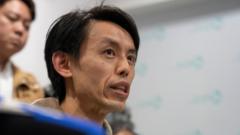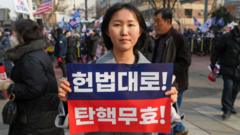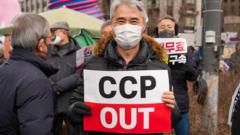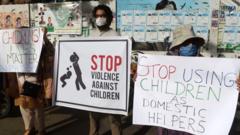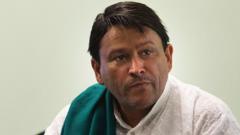In a landmark ruling reflecting the nation’s political divide, four former South Korean officials received suspended prison sentences for forcibly repatriating two North Korean fishermen accused of murder, showcasing the complexities of inter-Korean relationships and domestic political tensions.
South Korean Officials Sentenced for Controversial Deportation of North Korean Fishermen

South Korean Officials Sentenced for Controversial Deportation of North Korean Fishermen
Legal ramifications arise from the politically charged case of North Korean defectors who sought asylum in South Korea after committing murder.
The recent legal proceedings have highlighted the contentious issue surrounding North Korean defectors in South Korea. In 2019, two young fishermen accused of murdering their shipmates fled to South Korea seeking asylum. Their case escalated when the progressive administration of then-President Moon Jae-in denied them refugee status and returned them to the North, igniting widespread protests and attracting intense media scrutiny. The response from civil rights groups emphasized the individuals' desperate attempt to escape a regime that is notorious for human rights abuses and executions.
Following the shift in power to the current administration led by President Yoon Suk Yeol in 2022, the narrative surrounding the incident evolved, leading to criminal charges against four senior officials involved in the decision to deport. This unprecedented situation resulted in a three-judge panel at the Seoul Central District Court finding the officials guilty of abusing their power. Their sentences ranged from six to ten months in prison but were suspended for two years, with an acknowledgment of the political motivations surrounding the case.
The polarizing nature of this issue exposes the divergent views held by South Korea's major political factions regarding how to handle relations with North Korea. The former officials included Moon Jae-in's national security adviser and other key figures, illustrating the depth of the political implications tied to a single decision.
This case underlines the broader implications of inter-Korean relations and prompts questions about the future of North Korean defectors seeking refuge in South Korea, amidst a backdrop of political rivalry and ethical considerations in dealing with crimes against humanity. The ongoing dialogue on this topic continues to resonate not just in South Korea but across the globe, as the universe of North-Korean related issues grows more complex.
Following the shift in power to the current administration led by President Yoon Suk Yeol in 2022, the narrative surrounding the incident evolved, leading to criminal charges against four senior officials involved in the decision to deport. This unprecedented situation resulted in a three-judge panel at the Seoul Central District Court finding the officials guilty of abusing their power. Their sentences ranged from six to ten months in prison but were suspended for two years, with an acknowledgment of the political motivations surrounding the case.
The polarizing nature of this issue exposes the divergent views held by South Korea's major political factions regarding how to handle relations with North Korea. The former officials included Moon Jae-in's national security adviser and other key figures, illustrating the depth of the political implications tied to a single decision.
This case underlines the broader implications of inter-Korean relations and prompts questions about the future of North Korean defectors seeking refuge in South Korea, amidst a backdrop of political rivalry and ethical considerations in dealing with crimes against humanity. The ongoing dialogue on this topic continues to resonate not just in South Korea but across the globe, as the universe of North-Korean related issues grows more complex.

